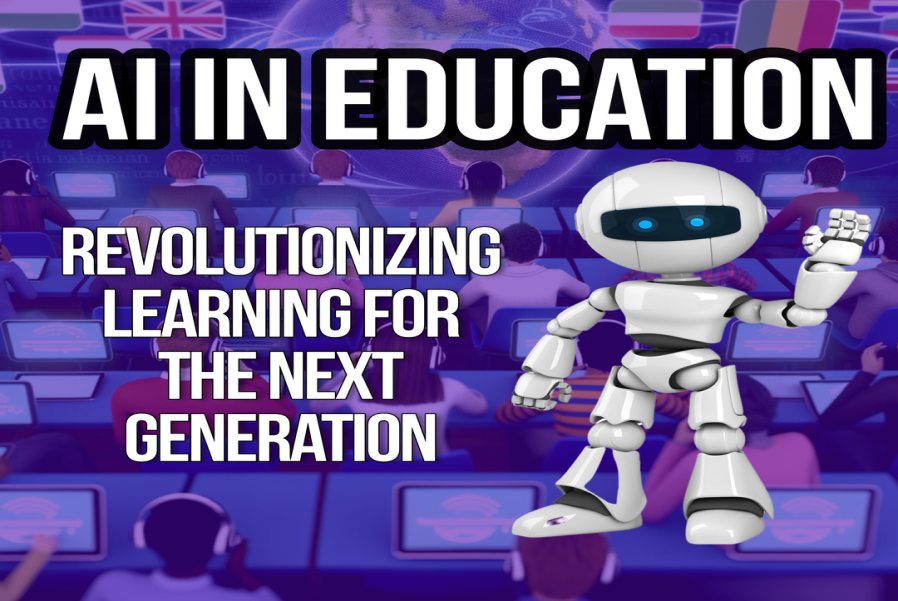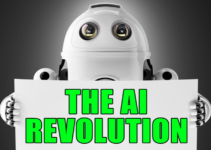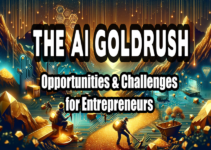What if the classrooms of the future could make learning as thrilling as a journey through time and space? Well, that is QUICKLY becoming a reality thanks to the power of Artificial Intelligence (AI). Yes, AI stands at the forefront of a revolution, transforming the way knowledge is delivered, absorbed, and applied.
This blog post delves into the heart of this transformation, exploring how AI technologies are not just augmenting the educational landscape but are redefining it entirely. From personalized learning paths that adapt to each student’s pace and style, to AI-powered tutors that are available 24/7, the impact is profound and all-encompassing.
As we navigate through the realms of virtual classrooms, smart educational software, and interactive learning environments, we uncover how these advancements promise to equip the next generation with unparalleled skills and knowledge.
By reading this blog post, you’ll gain insights into the innovative applications of AI in education and how they are poised to solve traditional challenges, making learning more engaging, accessible, and effective for students across the globe. Prepare to be inspired by the possibilities of tomorrow, where education and technology converge to create a brighter future for all.
The Current State of Education and the Need for Innovation
The traditional model of education, you know, the one with chalkboards and 30 kids all learning the same thing at the same pace? It’s been around for ages. And while it’s got its merits, let’s face it – it’s a bit like trying to fit square pegs into round holes in today’s fast-paced, digital world.
We’re in an era where technology changes faster than fashion trends. Yet, many classrooms still operate on a one-size-fits-all basis. It’s not just outdated; it’s inefficient. Students are diverse, with unique talents, learning speeds, and interests. So, why should their education be uniform?
The Demand for Personalization
Enter personalized learning – the educational equivalent of tailoring a suit. It fits just right. But achieving this level of personalization? Easier said than done. It demands technology integration that many schools struggle to implement. And that’s where our classrooms start to feel more like time capsules than gateways to the future.
Now, we can’t just throw iPads into the mix and call it a day. No, what we need is a deeper, more intelligent form of tech integration. Something that doesn’t just digitize textbooks but transforms the learning experience itself.
That’s where AI comes in, wielding the power to customize learning experiences, adapt to student needs, and even predict learning outcomes. It’s like having a personal tutor for each student, one that’s always on call.
So, as we stand at the crossroads between tradition and innovation, it’s clear: AI isn’t just a promising solution; it’s a necessary evolution. In the following sections, we’ll explore how this tech marvel is making personalized learning not just a dream but a reality. Stay tuned as we unveil the future of education, one AI innovation at a time.
Understanding AI and Its Applications in Education
Revolutionizing Teaching Methods with AI

Enhancing Student Engagement and Learning Outcomes
Navigating the future job market without a compass could lead you straight into uncharted waters. Guess what’s the compass here? AI education. It’s not just a nice-to-have; it’s a must-have in curriculums to prep students for a future where AI is as common as smartphones.
AI Education: The New ABCs
Integrating AI into school curriculums is like giving students a flashlight in a dark forest. It lights up paths they didn’t even know existed. This isn’t about turning every kid into a coding genius but ensuring they’re comfortable navigating a world where AI plays a major role.
Building AI Literacy
Developing AI literacy programs is like teaching kids to swim in the digital ocean. It’s about fostering skills that go beyond just knowing how to use technology. We’re talking critical thinking, problem-solving, and the agility to adapt—skills that AI can both demand and nurture.
Partnerships That Power Learning
Imagine if classrooms had the latest AI tools straight from Silicon Valley or if tech gurus guest lectured about real-world AI applications. That’s the power of partnerships between educational institutions and tech companies. They bring hands-on, cutting-edge AI learning experiences right to the classroom doorstep.
A Future-Proof Education
These collaborations are more than just a cool addition to the school day. They’re a bridge connecting students with the future, equipping them with the knowledge and skills to thrive in an AI-driven world. Whether it’s understanding how algorithms affect our lives or tackling ethical questions around AI, these experiences turn abstract concepts into tangible lessons.
AI: More Than Just Tech
Preparing students for the future with AI education is about painting a bigger picture. It’s showing them that AI isn’t just a tool for techies but a fundamental part of our future society. By weaving AI literacy into curriculums, fostering critical digital skills, and building bridges with the tech world, we’re not just preparing students for jobs that don’t yet exist. We’re empowering them to shape the future of those jobs.
So, as we look ahead, the question isn’t if AI will be part of our future, but how well we prepare our students to lead it. Let’s make AI education not just a chapter in textbooks but a cornerstone of learning, opening doors to opportunities we can only begin to imagine.
Ethical Considerations and Challenges
Diving into AI in education isn’t just about riding the wave of tech advancements. It’s also about navigating the tricky waters of ethics and challenges. Let’s paddle through these considerations, shall we?
Navigating the Sea of Data Privacy
Imagine your personal info floating around like a message in a bottle, for anyone to find. Not cool, right? That’s why data privacy is a big deal. In education, protecting students’ info is paramount. AI systems feast on data, so ensuring this data is handled with care is essential. We’re talking Fort Knox levels of security here.
Battling Bias in AI
AI is like a mirror reflecting the data it’s fed. If that data shows bias, the AI’s decisions will too. This could mean unfairly grading essays or offering biased learning recommendations. Keeping AI fair means constantly checking and balancing its inputs and learning processes. Think of it as teaching AI to play fair in the sandbox.
Bridging the Digital Divide
Not everyone has the same tech at their fingertips. Some students might be trying to join a digital class with just a phone, while others might have the latest gadgets. This digital divide can widen educational gaps. AI could either bridge this divide or make it bigger. The goal? Make sure AI tools are as accessible as picking up a pencil.
Subheading: The Human Touch in a Digital World
Implementing AI in schools isn’t just about plugging in and playing. It requires solid infrastructure, like reliable internet and devices. Plus, teachers need to become part tech-whiz to guide these AI tools effectively. And let’s not forget, at the heart of education is the human connection—something AI can’t replace. Ensuring the human element remains central amid all this tech is crucial.
Educating the Educators
Training teachers to use AI isn’t just about showing them which buttons to press. It’s about integrating AI with their teaching style, making sure it enhances rather than replaces their role. Teachers are the captains of the classroom, with AI as their first mate.
The Balancing Act
Balancing the benefits of AI with ethical considerations and challenges is like walking a tightrope. It’s about ensuring AI in education helps rather than hinders, includes rather than excludes. We need to keep the dialogue open, constantly evaluate and adjust our course to ensure AI serves as a tool for empowerment and equality.
As we forge ahead, remembering the human heart at the core of education, alongside the dazzling possibilities of AI, will be our guiding star. Let’s navigate these waters together, ensuring AI in education sails us into a future that’s not only smarter but also fairer and more inclusive for all.
The Future of AI in Education
As we stand on the brink of tomorrow, peering into the vast universe of AI in education, it’s like gazing at a sky full of stars—each point of light a potential innovation ready to change the game. Let’s take a leap into what the future might hold.
AI: The Next Frontier in Learning
Picture this: AI that doesn’t just adapt to individual learning styles but predicts them before a student even logs in. We’re talking about AI that can foresee which topics a student might struggle with or excel in, crafting a learning path that’s not just personalized but prophetic.
Virtual Reality: Immersive Learning on Steroids
Virtual reality (VR) powered by AI could transport students to ancient civilizations or inside a human cell. But what if VR could also adapt in real-time, changing the complexity of information based on a student’s responses? The line between learning and living the lesson blurs.
AI Mentors: Guiding Students Beyond Academics
Imagine AI mentors that guide students not just academically but emotionally, offering advice on time management, stress, and even career planning. These AI companions could become a student’s personal cheerleader, counselor, and coach, all rolled into one.
Keeping AI in Check
With great power comes great responsibility. As AI becomes more integrated into education, the need for ongoing evaluation and ethical checks is paramount. Ensuring AI tools are fair, unbiased, and respectful of privacy will be an ongoing journey, not just a checkbox.
AI Ethics: A Pillar of Education
Teaching students about AI ethics will become as essential as teaching math or science. Understanding the power and potential pitfalls of AI will be crucial for the next generation, ensuring they wield this tool wisely.
Collaboration Is Key
The future of AI in education isn’t just in the hands of programmers and educators. It will be shaped by students, parents, policymakers, and society at large. Collaboration across these groups will ensure AI tools not only advance learning but also align with our collective values and aspirations.
The Horizon Awaits
As we gaze into the future, it’s clear that AI has the potential to make learning more engaging, personalized, and impactful than ever before. But this future isn’t set in stone. It’s ours to shape through careful consideration, collaboration, and a commitment to ensuring technology enhances the human experience of learning.
So, as we step into tomorrow, let’s embrace AI in education with open minds and vigilant hearts, ready to explore the possibilities while safeguarding the values that make us uniquely human. The journey ahead is as exciting as it is uncertain, but one thing’s for sure—the future of education is bright, and AI will be a part of that brilliance.
Conclusion
And there we have it—a journey through the transformative world of AI in education. It’s been a ride, right? From tailor-made lessons to virtual reality classrooms, we’ve explored how AI is not just changing the game but completely rewriting the rules.
AI: The Education Game-Changer
The potential of AI to revolutionize education is as vast as the universe. It’s about creating learning experiences that adapt, inspire, and engage every student, making education not just a path to knowledge but an adventure.
Empowering Future Generations
Embracing AI in education is about more than keeping up with tech trends. It’s about empowering the next generation with the skills they’ll need in an AI-dominated future. It’s about fostering creativity, critical thinking, and adaptability—skills that machines can’t replicate.
But this isn’t a journey we can take alone. Educators, policymakers, and tech developers need to join forces. Together, we can ensure AI in education is used responsibly and inclusively, leveling the playing field for all students, regardless of their background.
As we stand on the brink of this new educational frontier, let’s commit to continuous learning, not just for our students but for ourselves. Let’s explore the possibilities, navigate the challenges, and shape a future where AI in education opens doors to worlds of opportunity for every learner.
ABOUT THE AUTHOR
Robert Sean Pascoe is a direct response copywriter and marketing strategist who works with entrepreneurs worldwide to create advertising and marketing campaigns that MAXIMIZE their profits.
He LOVES Rock N Roll, old school pro wrestling, Star Wars and pretty much ANYTHING 1980’s.
With 7 years of freelance copywriting experience and a lifetime in sales, Robert knows how to use the power of words to sell virtually anything to anyone, especially if the market has been properly defined (and you BETTER have that right!).
Robert enjoys primarily working with small business owners to sell more of their products and services through the power of direct response advertising and marketing.
He has written sales copy for companies in such diverse niches as Weight Loss Supplements, Skin Care, Male Enhancement, Local Marketing Agencies, Live Event Seminars, Software Developers, Insurance Agencies, Real Estate Brokerages, Marketing Consultants, and many more.









